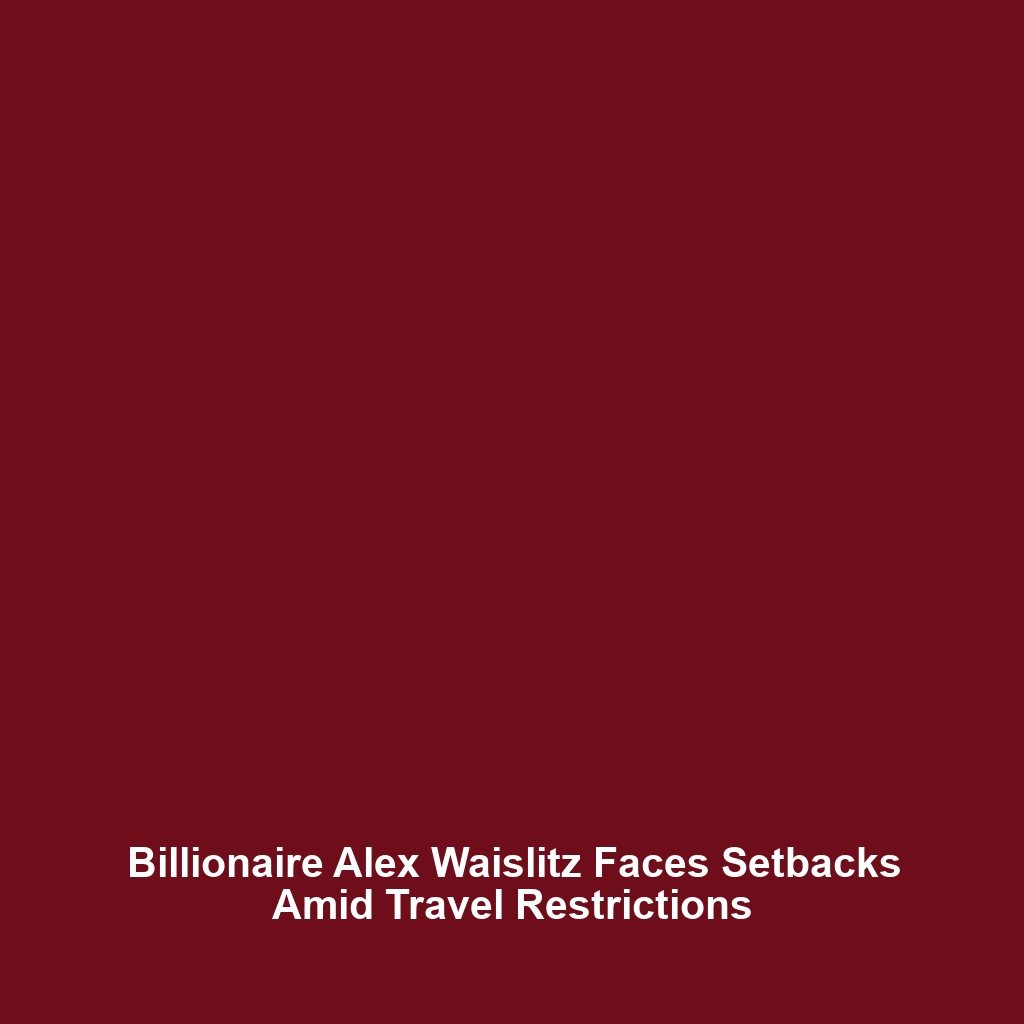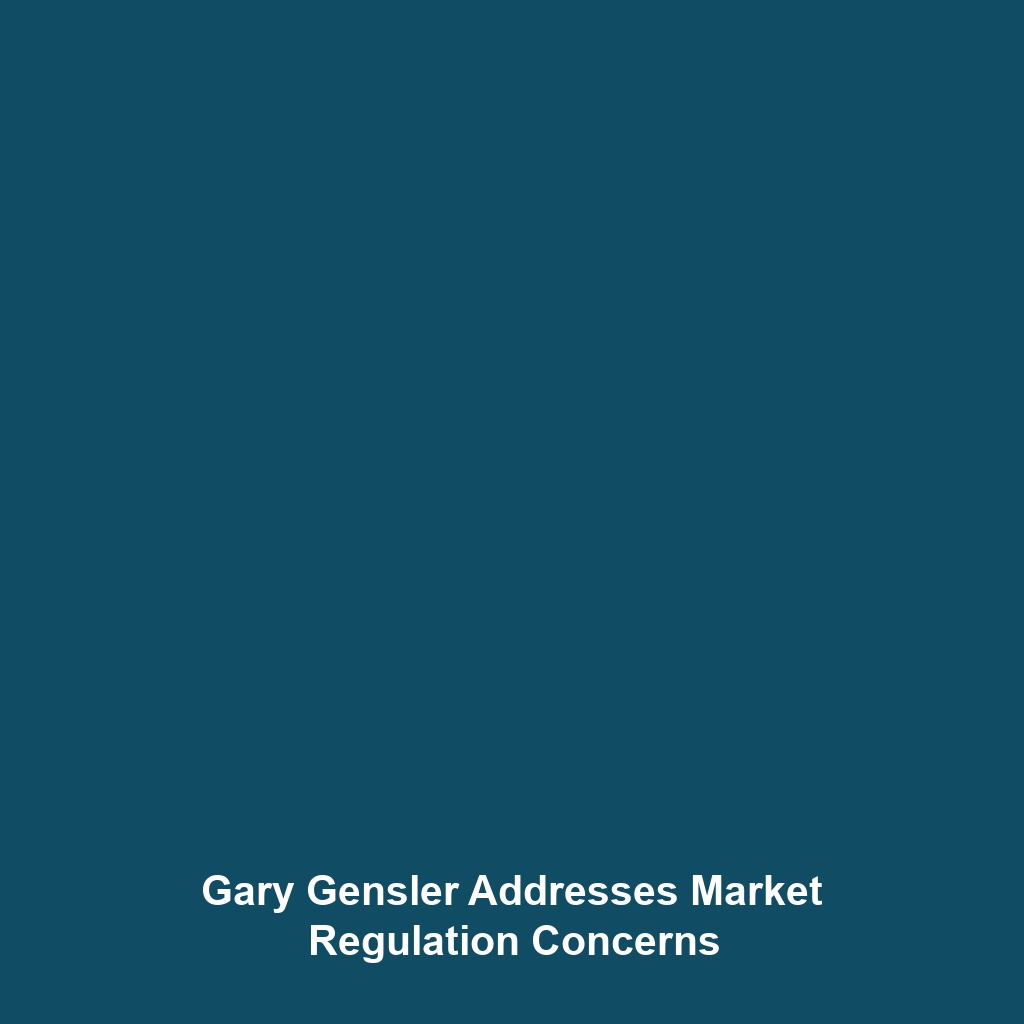Your cart is currently empty!
Tag: compliance

Billionaire Alex Waislitz Faces Setbacks Amid Travel Restrictions
Billionaire Alex Waislitz Faces Setbacks Amid Travel Restrictions
Billionaire Alex Waislitz Faces Setbacks Amid Travel Restrictions
Billionaire investor and entrepreneur Alex Waislitz is currently navigating a series of challenges as ongoing legal disputes hamper his international business operations. The founder of Thorney Investment Group, Waislitz has built a reputation in the investment world, but recent developments have raised concerns about his mobility and the impact on his portfolio.
Legal Disputes and Their Impact
Waislitz is embroiled in multiple legal battles, which have significantly disrupted his business dealings across borders. Sources indicate that these legal challenges are not only draining resources but also causing delays in critical investments that could expand his business empire.
The primary legal issue revolves around allegations related to investment practices and compliance with international regulations. Details regarding these allegations remain closely guarded, but industry insiders have noted how they have already impacted Waislitz’s ability to travel freely and engage with potential investors and partners worldwide.
Travel Restrictions Compounding Challenges
As the legal disputes unfold, Waislitz’s international travel has become increasingly restricted. Lawsuits, particularly those that overlap with international jurisdictions, often complicate a defendant’s ability to travel. Waislitz’s caution in undertaking international trips is evident, especially as he faces increased scrutiny in several countries.
Travel restrictions have a cascading effect on business ventures. For an investor like Waislitz, who frequently seeks opportunities in emerging markets, being physically absent from those regions can jeopardize potential partnerships and significantly stall negotiations.
Investor Sentiment and Market Reaction
Market analysts are closely watching how these legal woes will affect Waislitz’s investment strategy moving forward. According to data collected from The Australian Financial Review, investor confidence seems to be wavering as reports of the legal challenges circulate.
“When a high-profile investor like Waislitz faces legal challenges, it naturally raises a red flag for other investors,” said Dr. Helen Fisher, a financial analyst at MarketWatch. “Investors typically prefer to engage with individuals who have a clear path and a solid reputation. The ongoing issues could alter the perceptions of his portfolio.”
Comparative Analysis of Industry Challenges
Waislitz is not alone in facing obstacles amid growing scrutiny of investment practices globally. Other investors have similarly experienced disruptions due to legal challenges, either stemming from regulatory changes or unexpected legal disputes. This trend appears reflective of broader uncertainties within the investment landscape, particularly regarding compliance and ethics.
For example, high-profile cases involving other billionaires have illustrated the precarious balance between aggressive investment strategies and adherence to legal obligations. These cases often highlight how quickly investor reputations can be impacted.
Future Outlook: Will Waislitz Overcome the Setbacks?
Looking ahead, the future for Waislitz remains uncertain amid these legal challenges. Analysts suggest that addressing the legal concerns head-on and re-establishing a strong public relations strategy could mitigate some damage to his reputation.
“Waislitz might find a way to navigate these challenges by being transparent about the legal issues and taking steps to comply with all necessary regulations,” noted Dr. Jennifer Mendez, an expert in investor relations. “Communication is key in maintaining stakeholder trust.”
Conclusion: The Road Ahead
As billionaire Alex Waislitz faces significant hurdles in the form of legal disputes and travel restrictions, the implications for his businesses will unfold over time. While his legal battles may present immediate obstacles, how he chooses to navigate these challenges will determine the trajectory of his investments and reputation in the long run.
Stakeholders and analysts will be watching closely to see if Waislitz can regain the momentum that has characterized his investment career thus far. His ability to adapt to the landscape of international business amid legal ramifications could ultimately serve as a case study for investors worldwide.

Robert Brockman Dies Amid Largest Individual Tax Fraud Case
Robert Brockman Dies Amid Largest Individual Tax Fraud Case
Robert Brockman Dies Amid Largest Individual Tax Fraud Case
Robert Brockman, the U.S. businessman at the center of a staggering $2 billion tax evasion case, has passed away at the age of 81. His death, which occurred on October 8, 2023, marks the conclusion of what has been termed the largest individual tax fraud case in American history.
The Tax Fraud Case
Brockman, best known as the former CEO of Reynolds & Reynolds, faced a series of serious charges initiated by federal prosecutors in 2020. Allegations against him included tax evasion, wire fraud, and money laundering. The U.S. government claimed that Brockman used offshore companies to shield income from the Internal Revenue Service (IRS), amassing significant wealth over a period spanning multiple decades.
Authorities further asserted that Brockman had been involved in a complex scheme utilizing a digital asset known as “Bitcoin.” This was aimed at concealing and transferring his income, underlining the sophistication of the fraudulent strategies employed. His case was notable not just for the amount involved but because it included elements that were relatively untested in court concerning cryptocurrency and tax evasion.
Legal Proceedings
Legal proceedings against Brockman began in earnest in 2020, with extensive investigations leading to formal charges that highlighted a pattern of practice designed to evade taxation. As the case unfolded, Brockman pleaded not guilty, although reports suggested he suffered from health issues that could complicate his ability to stand trial. His defense contended that the charges were unfounded and that various aspects were misrepresented.
In February 2023, just before trial proceedings were set to begin, Brockman was deemed unfit to stand trial due to apparent cognitive decline, a situation that stirred controversy and raised questions about accountability in high-profile financial crimes. His competency evaluation led to a series of legal maneuvers and public speculation regarding potential plea deals or his eventual fate.
Reactions to His Death
Brockman’s death has drawn mixed reactions from various segments of the public and financial community. While some view it as the end of a notorious chapter in U.S. financial history, others express concern about unresolved issues surrounding his significant tax liabilities. Experts in tax law and financial fraud are now left to ponder the implications of his death for future cases involving tax evasion and the government’s ability to recover a portion of the funds reportedly lost.
“This case represents a significant failure by the system to hold powerful individuals accountable,” said tax attorney Laura Bennett. “With Brockman’s passing, there remains a question of how to proceed with persistent enforcement of tax laws against individuals who can afford to exploit them.”
Brockman’s Legacy
Robert Brockman’s legacy is likely to be marred by his tax fraud case. He served as a prominent figure in the technology and finance sectors, with Reynolds & Reynolds being a significant provider of software solutions for car dealerships. His contributions to business were overshadowed by the extensive allegations against him and the sheer scale of his purported tax avoidance strategies.
As the legal system grapples with the ramifications of Brockman’s death, potential reforms in regulatory practices and tax enforcement could emerge. Experts indicate that the complexities of digital finance and offshore structures necessitate an urgent review of legal frameworks to enhance transparency and accountability.
Continuing Implications
While Brockman’s death brings an end to one individual’s legal saga, it also serves as a critical reminder of the challenges faced by the IRS and other enforcement agencies in combating sophisticated tax fraud schemes. There could be lasting implications for how similar cases are approached and prosecuted in the future.
The sheer scale of audacious tax evasion schemes underscores the importance of vigilance and continuous adaptation of laws to counteract evolving tactics used by wealthy individuals to escape tax obligations. Experts stress that public awareness and education on tax responsibilities is vital to preventing future occurrences of such high-profile cases.
Conclusion
The passing of Robert Brockman marks a significant juncture in the landscape of U.S. financial regulation and tax enforcement. His high-profile case brought attention to various intricate and emerging challenges in modern finance, particularly in the digital age.
As the nation reflects on the implications of his actions, the larger conversation about tax compliance and the responsibilities of wealthy individuals continues. This case, now concluded with Brockman’s death, serves as a pivotal point for analysis and potential reform in an era that demands greater scrutiny and integrity in financial dealings.

Gary Gensler Addresses Market Regulation Concerns
Gary Gensler Addresses Market Regulation Concerns
Gary Gensler Addresses Market Regulation Concerns
In a recent address, Securities and Exchange Commission (SEC) Chairman Gary Gensler tackled ongoing concerns regarding regulatory measures in the ever-evolving landscape of cryptocurrency and stock markets. Gensler emphasized the necessity for increased transparency and robust regulations to protect investors and ensure fair market practices.
Cryptocurrency Under Scrutiny
Cryptocurrencies have gained significant traction over the past few years, prompting regulators to closely examine their implications on financial markets. Gensler highlighted that the SEC is focused on fostering an environment that ensures investor protection. He pointed out that many cryptocurrency platforms operate without the necessary oversight, which can lead to fraud and market manipulation.
“The key is transparency,” Gensler stated. “We are working to ensure that any cryptocurrency trading platforms adhere to the same standards as traditional exchanges.” In light of recent events in the crypto space, such as the collapse of high-profile exchanges, his remarks resonate with the growing call for regulatory clarity.
Regulatory Measures for Stock Markets
Beyond cryptocurrency, Gensler offered insights into the ongoing regulatory framework surrounding stock markets. He underscored that enhancing market transparency is critical to preventing unethical practices such as insider trading and market manipulation.
“Our markets must serve the public interest,” Gensler remarked, advocating for rigorous enforcement of existing regulations. He specifically mentioned the need for improved reporting standards and more accessible information for investors, which could diminish asymmetrical information between market participants.
The Role of Technology in Regulation
An important aspect of Gensler’s address was the integration of technology into the regulatory process. He noted that technological advancements can help the SEC detect irregularities in trading more efficiently and can ensure compliance with regulations.
“We must harness technology to oversee these rapidly changing markets,” he stated, referring to the SEC’s efforts to implement advanced analytics to monitor trading patterns. This shift towards technology-driven regulation aims not only to mitigate risks but also enhance overall market integrity.
Seeking Input from Stakeholders
Gensler also highlighted the importance of dialogue with various stakeholders, including industry players and the public, in shaping the future of market regulation. He called for comments and discussions on proposed regulatory frameworks, indicating that engagement is vital to create comprehensive and effective regulations.
“We want to hear from all corners—whether you are a small investor, a major corporation, or an innovative startup,” he emphasized. This approach reflects a recognition of the diverse perspectives that influence the dynamic financial landscape.
Expert Opinions and Industry Reactions
Industry experts largely support Gensler’s call for increased transparency and robust regulation. Bradley J. Bondi, a former SEC official and currently a partner at a Washington D.C. law firm, noted, “The push for clarity in crypto regulations is not just necessary—it’s overdue. The market is maturing, and so must the regulatory framework.”
Additionally, Kristin N. Novoa, a financial analyst, spoke on the necessity of balancing innovation with regulation, stating, “While we need to protect investors, we also have to foster an environment that encourages tech-driven financial solutions.” This sentiment echoes a common theme among market analysts who argue that overly restrictive regulations could stifle innovation.
Conclusion: A Call for Comprehensive Regulation
Chairman Gensler’s address highlighted critical concerns regarding the regulation of both the cryptocurrency market and traditional stocks. By advocating for increased transparency and the use of technology in regulatory practices, he aims to enhance investor protection and market integrity.
Looking ahead, the SEC’s actions and proposed regulations will be closely monitored by industry participants and investors alike. As the regulatory environment continues to evolve, Gensler’s leadership will be pivotal in navigating the complexities of modern financial markets.
For further updates on market regulations, stay informed through reliable news platforms and the SEC’s official communications.

Binance USD (BUSD)
Binance USD (BUSD): A Comprehensive Overview
Binance USD (BUSD) is a stablecoin issued by Binance, the world-renowned cryptocurrency exchange. Its ticker symbol is BUSD, reflecting its backing by the U.S. dollar at a 1:1 ratio, making it a popular choice for cryptocurrency traders and investors looking to maintain a stable digital asset amidst the volatility of the crypto market.
Founders, Launch Date, and History
BUSD was launched in September 2019 by Binance in collaboration with Paxos, a regulated financial institution. The creation of this cryptocurrency came at a time when the market was witnessing a surge in demand for stablecoins as a means to facilitate trading and provide liquidity. Key milestones in BUSD’s history include receiving approval from the New York State Department of Financial Services (NYDFS), which distinguishes it as one of the few stablecoins to operate under regulatory oversight.
Blockchain Platform
BUSD operates primarily on the Ethereum blockchain as an ERC-20 token, providing compatibility with various decentralized applications (dApps) and wallets. It leverages the advantages of Ethereum’s smart contract capabilities, enabling users to engage in a wide array of functionalities on the blockchain. Additionally, BUSD is also issued on the Binance Smart Chain (BSC), allowing for faster and cheaper transactions.
Purpose and Use Case
The primary purpose of BUSD is to serve as a stable digital currency for trading and financial interactions within the broader cryptocurrency ecosystem. Its use cases extend to DeFi applications, serving as a medium of exchange, collateral in lending platforms, and a tool for price stability during trading activities. By providing a stable asset, BUSD assists users in mitigating the risks associated with price volatility common in the cryptocurrency market.
Technology and Consensus Mechanism
BUSD benefits from the underlying technologies of the Ethereum and Binance Smart Chain networks. While BUSD itself does not utilize a consensus mechanism, it inherits the proof-of-work method from Ethereum and the delegated proof-of-stake mechanism from BSC. This enables a secure and efficient experience for users transacting with BUSD, while also supporting various blockchain-based functionalities.
Supply and Tokenomics
The maximum supply of BUSD is not capped; however, it is minted in tandem with the deposits of U.S. dollars, ensuring a 1:1 backing. Currently, the circulating supply is frequently updated through real-time audits conducted by PwC, enhancing transparency and trust. While BUSD does not offer staking rewards, it allows usage in liquidity pools and trading pairs that can yield returns for users in DeFi platforms.
Use Cases and Adoption
BUSD has found broad adoption across numerous real-world applications and partnerships. It is commonly used as a medium for trading pairs on major exchanges, facilitating smoother transactions in the cryptocurrency market. Additionally, BUSD is utilized by numerous DeFi projects, lending protocols, and payments systems, further showcasing its versatility as a stable digital asset.
Market Performance and Metrics
As of the latest updates, BUSD boasts a market cap consistently around the top tier of stablecoins, often exceeding $10 billion. The historical price trends showcase its stability, maintaining a value close to $1 due to its fiat backing. Trading volumes have remained robust, indicating a healthy demand for BUSD amid fluctuating market conditions.
Where to Buy and Trade
BUSD can be traded on various centralized exchanges (CEXs) such as Binance, Coinbase, and Kraken. Additionally, it is available on decentralized exchanges (DEXs) like Uniswap and PancakeSwap, providing users with flexibility in trading and liquidity provision.
Security and Risks
BUSD has a strong security framework, bolstered by the backing of Paxos, which is under regulatory oversight in New York. However, like any cryptocurrency, risks remain, including regulatory changes and market fluctuations. Users should remain vigilant about potential vulnerabilities and conduct thorough research before investing.
Community and Governance
The governance model for BUSD revolves around transparency and regulatory compliance, driven by its partnership with Paxos. Community engagement is facilitated through forums and social media, allowing users to stay updated with developments and governance-related discussions.
Competitors and Differentiation
Drawing comparisons with other stablecoins like Tether (USDT) and USD Coin (USDC), BUSD distinguishes itself through its regulatory compliance and backing by a licensed trust company. Its dual issuance on Ethereum and Binance Smart Chain also sets it apart, enhancing its utility across different platforms.
Roadmap and Future Developments
Looking ahead, BUSD is expected to expand its integrations within the DeFi space and attract additional partnerships to enhance its ecosystem. Plans for further technological enhancements and potential listings on more exchanges underscore its commitment to sustained growth and adoption.
Wallet Compatibility
BUSD is supported by various cryptocurrency wallets, including hardware wallets like Ledger and Trezor, as well as software wallets such as MetaMask and Trust Wallet. This broad compatibility allows users to easily store and manage their BUSD assets securely.
Regulatory and Compliance Status
Due to its backing by a regulated entity, BUSD is compliant with existing regulations, providing an extra layer of trust for users. Nonetheless, the evolving regulatory landscape for cryptocurrencies can pose challenges and uncertainties in the long term.
Recent News and Updates
In recent months, BUSD has continued to expand its partnerships and enhance its services. Noteworthy collaborations in the DeFi sector have boosted its use cases, while regular audits ensure transparency and trustworthiness for users holding the stablecoin.
Summary and Call to Action
Binance USD (BUSD) presents a compelling option for those seeking stability in the volatile world of cryptocurrency. With its regulatory backing, significant market presence, and versatile use cases in DeFi and trading, BUSD remains an essential asset for traders and investors alike. For those interested in exploring BUSD further, we encourage you to do your research and consider incorporating it into your cryptocurrency portfolio.
For additional insights, visit UpCube.net. For more information, check out the official website and whitepaper.
This well-researched, SEO-optimized description of Binance USD (BUSD) emphasizes its relevance in the current cryptocurrency landscape while covering various aspects thoroughly.
